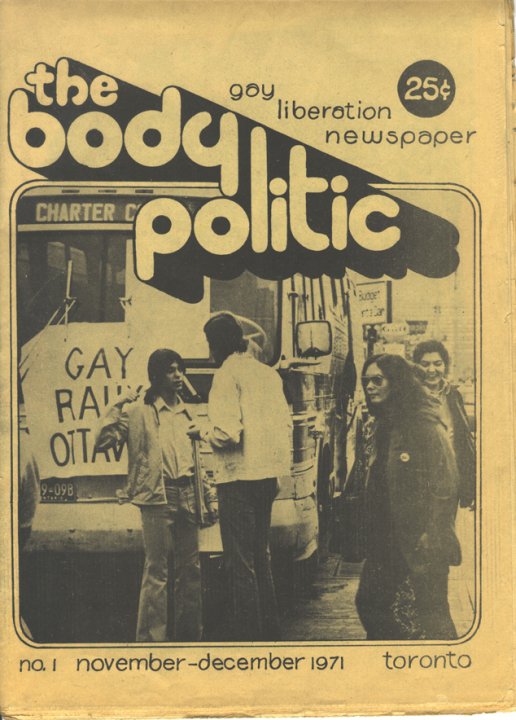Glad Day Bookshop is the oldest surviving 2SLGBTQ+ bookstore in the world. The first store of its kind in Canada, it was launched by pioneering gay activist Jearld Moldenhauer in December 1970 to help build Toronto’s fledgling gay rights movement. This was at a time when businesses were averse to selling a rapidly growing range of lesbian- and gay-positive publications. In the words of author Tim McCaskell, “Glad Day was a political project. It aimed to make available the suppressed history, culture, imagery and literature routinely denied to us.”

Canada’s First Gay Bookstore
Jearld Moldenhauer started his venture by buying and selling books out of a knapsack at gay meetings and rallies, from his home in Toronto’s Annex neighbourhood, and through mail order. Over the years, Glad Day grew to become one of the most comprehensive bookstores of its kind in the world.
An architect of the gay liberation movement, Moldenhauer was also a key figure in the creation of the Body Politic (the leading publication of Canada’s gay rights movement), Toronto Gay Action, the Gay Alliance Toward Equality and the Canadian Gay Liberation Movement Archives (now called the ArQuives).
Censorship and Seizures
Over the years, Glad Day faced censorship and discrimination, resulting in several notable legal battles. In May 1974, the Toronto Star refused to publish an ad for the bookstore, stating that it tended to “proselytize for the homosexual movement.” The newspaper later communicated that it would reconsider if the word “gay” was changed to “homosexual.” Glad Day refused and lodged a complaint with the Ontario Press Council, a media adjudication body. It concluded that the refusal constituted discrimination. Moldenhauer then filed a complaint with the Ontario Human Rights Commission. It ruled that its jurisdiction did not extend to discrimination based on sexual orientation. The decision came at a time when it was not yet illegal in Canada to discriminate against people based on their sexual orientation. (See also We Demand.)
In 1982, obscenity charges were laid against Glad Day’s assistant manager, Kevin Orr, for selling gay porn magazines. A judge ruled that depictions of gay sex in the magazines were “lewd and disgusting.” In 1987, Glad Day appealed and won a ban and seizure by Canada Customs of the book The Joy of Gay Sex. This forced the government to rewrite their guidelines to allow depictions of anal sex. Despite this victory, Glad Day continued to encounter challenges. Of the 1987 ruling, Moldenhauer later wrote, “our success only further infuriated Canada Customs, which simply increased its assault on the bookstore.” He added, “the authorities were determined to put Glad Day out of business.”
In 1990, the Globe and Mail reported that “Canada Customs Inspectors routinely detain for evaluation nearly 75 per cent of the books and magazines shipped to Glad Day.” This was also true of other 2SLGBTQ+ bookstores across the country, such as Little Sister’s Book and Art Emporium in Vancouver. For example, in a 1992 court case, the judge ruled that sexually explicit material would harm the community. At the time, heterosexual pornographic material had no trouble making it across the border.
The Globe and Mail further reported, “A recent casual survey of a dozen or so Canadian booksellers couldn’t turn up one who could remember ever receiving a Notice of Detention; Glad Day owner Jearld Moldenhauer could paper his office with them.” The article added, “What we have is a bad law, badly interpreted and inconsistently enforced by people with built-in biases and questionable judgment, to the detriment of a substantial minority of Canadian society.”
Material detained by Canada Customs extended beyond erotica. It included biographies and works of fiction, sociology, history and culture. Even books on the AIDS crisis were banned. Publications Glad Day was able to import were sometimes required to have sections redacted. Examples from the mid-1980s included advertisements for condoms, one of the only means of protection against HIV/AIDS.
Another court case from 1992 resulted from the seizure of Bad Attitude, a lesbian magazine containing a fictional erotic story. The resulting legal challenge constituted the first attempt to secure a judicial distinction between 2SLGBTQ+ community standards and those of the heterosexual community, as defined by judges. Nevertheless, Glad Day was convicted, which unleashed outrage and protests.
Referencing the Bad Attitude case, Jeff Moore, co-chair of the Canadian Committee Against Customs Censorship, stated, “If we don't have the right to look at ourselves laughing, crying and dying, we have no present, we have no past, and maybe we have no future. Without proof that we exist, Canadian lesbian and gay children will grow up as we did, isolated from the joy of lesbian and gay life and left to battle the self-hatred they are taught by the majority. Without books, magazines and videos we cannot communicate with each other about our lives.”
Boston Location
In 1979, Jearld Moldenhauer (who was born and educated in New York) opened a second Glad Day Bookshop, in Boston, Massachusetts. Moldenhauer hoped that a US store would have better access to gay literature and not be subject to the same degree of censorship as the Canadian store. The Boston store, which shared space with two gay newspapers, was destroyed by arson in July 1982. But the bookstore reopened and was an important part of Boston’s queer community until closing in 2000.
(See also Pink Triangle Press; The Body Politic; Queer Culture.)

 Share on Facebook
Share on Facebook Share on X
Share on X Share by Email
Share by Email Share on Google Classroom
Share on Google Classroom


